Pope’s Slovakia visit sends signal after brief Hungary stop
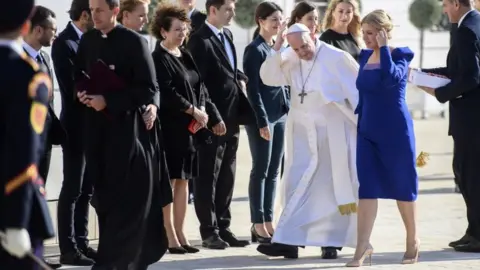 EPA
EPAPope Francis has begun a four-day visit to Slovakia, the first papal visit to the country in 18 years.
Typically, he's going out of his way to embrace the most excluded members of society - he'll tour a homeless shelter and also visit the impoverished Roma minority in Slovakia's far east.
But the pastoral, of course, is never far from the political.
"This trip is... very pleasing for us Slovaks," said analyst Imrich Gazda.
"It's very encouraging, but it's also very surprising," he said as we sat opposite the Presidential Palace in the capital Bratislava.
"We're asking the question again and again - why did he decide to come and spend four days here? There have been various hints but no real explanation. Maybe he himself will tell us the answer."
It's fair to say the pontiff's relatively long Slovak visit - 70 hours, compared to the seven hours he spent on a brief stopover in Hungary - has produced not just pleasure but puzzlement, even among Catholics.
Gazda, who writes on Catholic matters for the conservative online daily Postoj, agreed with those Vatican commentators who think Pope Francis is sending a subtle message.
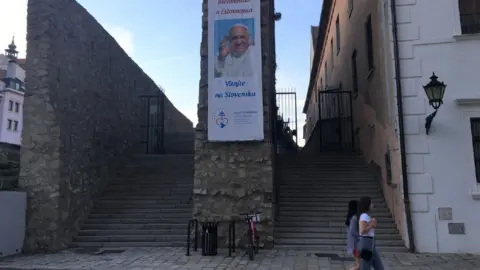
Hungary is home to fiery nationalist Prime Minister Viktor Orban, with whom Pope Francis has clashed on whether Europe should accept asylum seekers, especially from the Muslim world.
In the past, some of the PM's supporters in Hungary have mocked the Pope as "anti-Christian" for his comments on helping refugees.
At a Sunday Mass in Hungary, Pope Francis alluded to the issue, saying: "The cross, planted in the ground, not only invites us to be well-rooted, it also raises and extends its arms towards everyone."
He made those comments after meeting Mr Orban for about 40 minutes at a museum in Budapest.
In contrast, the Pope received a red-carpet welcome when he met with Slovakia's female president, Zuzana Caputova, at the Presidential Palace on Monday morning.
A former lawyer and environmental campaigner, she is a liberal (and Catholic) politician who uses far more tolerant and inclusive language when talking about such things as LGBT rights or refugees.
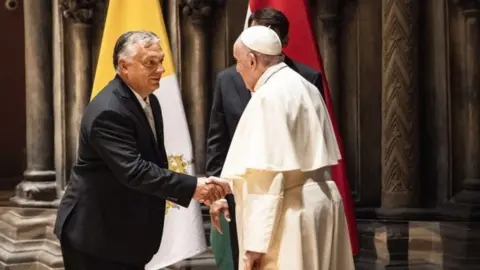 EPA
EPAAcross town in Bratislava's St Martin's Cathedral, where Hungarian kings were crowned for almost three centuries, Father Radoslav Saskovic was making the last-minute preparations for the Pope's visit. Soft-spoken, young and welcoming, he was quick to correct me when I described Pope Francis as "liberal".
"In my opinion Pope Francis is definitely not a traditionalist, but he is definitely not a liberal," he told the BBC.
"I think he is the right Catholic conservative that I think a Catholic conservative is supposed to be."
At a time of falling church attendance - and Covid-19 restrictions - St Martin's had still drawn dozens of worshippers for Sunday mass. But beyond the yellow-and-white flags fluttering from lampposts, the atmosphere - at least in Bratislava - felt rather muted.
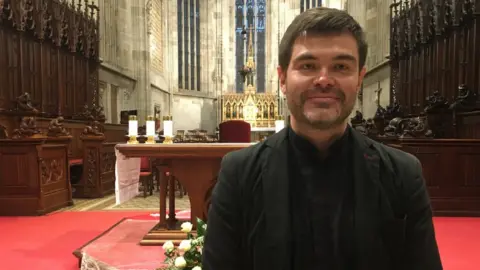
"Catholics are very, very reserved about his visit," said Michal Havran, a TV host and writer who studied Protestant theology in France.
"I remember the visits of Pope John Paul II here. He was like a superstar. Millions of people were coming. Now, it's completely different."
Around us people chose ice cream and sipped cocktails, seemingly oblivious to matters papal or ecclesiastical.
"If you go to the isolated Facebook forums of conservative Catholics, you can see and you can read opinions saying that this Pope is not a Catholic, this is not real Catholicism," Mr Havran said.
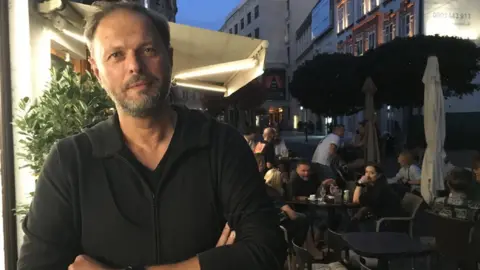
Certainly, there has been pushback here against Pope Francis' embrace of asylum seekers and homosexuals, even of his support for vaccination.
Mr Havran said he even thought he enjoyed warmer support amongst non-Catholic Slovaks than Catholic Slovaks.
That, perhaps, is difficult to measure. A large billboard on the motorway read: "'Abortion Equals Murder' - Pope Francis". It was unclear as I sped past whether the billboard was approving or critical.
Perhaps Catholics in Slovakia - like Catholics everywhere - are still trying to get the measure of Pope Francis: too liberal for some conservatives, too conservative for some liberals.

